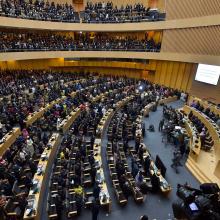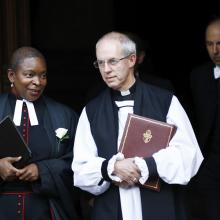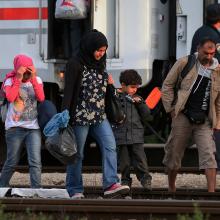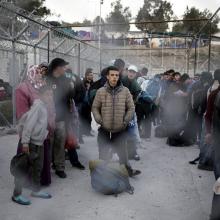xenophobia
A population exchange with Turkey after World War I brought in over a million ethnic Greeks as refugees. When the new migration crisis began last year, there was empathy for the new arrivals, with many Greeks recalling what their grandparents went through.
But even given that proud history, academics and volunteers fear that the warm welcome of the last year could wear thin, when the refugees start to integrate in a nation that has long resisted a multifaith identity.
Amazigh was one of 125 queer Muslim activists and allies who came together for The Inner Circle’s seven-day Annual International Retreat, from Oct. 14 to Oct. 21, in South Africa. The gathering focused on “building a movement towards an all-inclusive and compassion-centered Islam,” a mammoth task for attendees like Amazigh who live in countries where homosexuality and transgender expression are often taboo and criminalized.

The Ordinary Session of the Assembly of African Heads of State and Government of the African Union Summit in Addis Ababa, Ethiopia. Jan. 29-31. Via GovernmentZA / Flickr.com
Currently, only 13 of the 54 member states offer liberal access (visa free or visa on arrival) to all Africans. African Development Bank recently released a report aimed at highlighting the economic benefits of visa ppenness by citing examples of Seychelles (a country that has been an early reformer in relaxing visa requirements to boost its tourism sector), and Mauritius and Rwanda (both of which saw an increase in African business and leisure travelers and consequently, an increase in economic activity).
While the positives are plenty, there’s also a lot that the AU could learn from the EU.

Archbishop of Cantebury Justin Welby chats with a fellow member of the clergy. Photo via REUTERS / Stefan Warmth / RNS
Describing the uncertainty and fears that have followed the Brexit vote, religious leaders said people should not become mistrustful of "the other."

Image via Tomek Nacho/Flickr
"The campaign run by one of the loudest proponents of leaving, the U.K. Independence Party, flirted with xenophobia, nativism and what some of its critics considered racism. But the official, more mainstream Leave campaign also invoked immigration as an issue, and its slogan, “Take control,” resonated with voters who feel that the government is failing to regulate the inflow of people from Europe and beyond."

Image via Ryan M. Bolton / Shutterstock.com
In a three-page letter, U.S. Rep. Filemon Vela blasted Donald Trump as a “racist” and told him “you can take your border wall and shove it up your ass,” reports Chron.
Vela, a Democrat from the border town of Brownsville, Texas, opened the letter diplomatically, admitting that he agrees with Trump that the government has failed veterans, that Mexican drug cartel violence requires a more serious response, and that felons who are undocumented ought to be deported.

Image via CAIR / RNS
The nation’s largest Muslim civil rights and advocacy organization has been earnestly educating Americans for years about Islam while denouncing the growing tide of anti-Muslim bigotry.
But it’s always an uphill battle, so this week the Council on American-Islamic Relations decided to try a little humor instead. The result is the introduction of a spoof medication called “Islamophobin” that seems sure to get more notice than CAIR’s usual campaigns.

Image via David Gibson / RNS
The Roman Catholic bishop of Brooklyn, one of the largest and most diverse dioceses in the U.S., is defending immigrants in a powerful essay that — without mentioning names — seems to take direct aim at Donald Trump and his supporters by ripping the “racist and xenophobic tendencies” in society and arguing that immigration in fact helps the economy.

Screenshot via NBC News / Youtube.com
“I think it’s unfortunate that a lot of Asian Americans don’t know who Vincent Chin is,” one of the respondents says. Make that even more Americans, of every heritage.

Image via Osservatore Romano / Reuters / RNS
Pope Francis is calling on Catholics to play a part in the “rebirth” of a united Europe that opens its doors to refugees.
The Argentine pontiff, who has been critical of European countries’ handling of the migrant crisis, made the comments as he picked up the prestigious Charlemagne Prize. The award, named after the founder of the medieval Holy Roman Empire, is given for work done in the service of European integration.

Image via REUTERS/David Ryder/RNS
The 2016 Republican presidential campaign boils with anti-immigrant rhetoric but candidates’ harsh proposals don’t resonate with most Americans, particularly religious believers and young adults.
A new analysis by the Public Religion Research Institute, released March 29 finds that many reject harsh proposals such as building a wall along the U.S.-Mexico border and deporting millions of undocumented immigrants, said Dan Cox, director of research for PRRI.

Image from 1856 work: Americanism versus Romanism. Via wikimedia commons.
There’s a name for xenophobic-motivated politics: nativism. Oxford Dictionaries defines nativism as: 1)The policy of protecting the interests of native-born or established inhabitants against those of immigrants, and 2) A return to or emphasis on traditional or local customs, in opposition to outside influences.
The Jungle is an informal camp for refugees in Calais, France. It currently houses nearly 7,000 people who live under tarpaulins and in tents. They are fleeing war-torn areas, economic collapse, and climate change in countries like Syria, Iraq, Afghanistan, Palestine, Sudan, and Ethiopia. There is no drainage in the camp, so when it rains it is a mudbath, there are a few toilets and standpipes.
The journey to The Jungle camp has been dangerous and exhausting for most of them, and new arrivals have often worn out their shoes walking across Europe, some have lost so much weight they need a new size of clothing when they arrive. People arrive traumatized and afraid.
In this season of preparing for Christmas, there is a growing number of unaccompanied children arriving on the U.S. southwestern border. The numbers have been increasing in the last few months, enough to move government offices to prepare for their coming. National security continues to be the most important governmental concern, but even then, laws require that migrant children detained by our government be fed and sheltered until they can be released to a legal sponsor. It leads me to wonder: If governmental offices are preparing to receive these unaccompanied children, then what are we Christians doing to prepare to receive them?
Every Christmas as the story of the birth of Jesus our Lord is read in congregations and in homes there are always the laments about how sad and even cruel it was that there was no place for Mary and Joseph and the baby Jesus. Where was the loving and caring welcome for them? We cannot change the most unwelcome reception the Christ Child received at his birth, but we can learn from it.
Speakers at the rally included representatives of the Islamic and Christian communities, the National Organization for Women, Code Pink, and Ghada Mukhdad, a Syrian refugee and member of the Syrian Civil Coalition which, according to their website, is a “lobby of Syrian civil society organizations, activists, and initiatives” that seeks to address “the increasing gap between the needs and priorities of the Syrian society on one hand and those making decisions concerning Syria.”

Moral Mondays March in Raleigh, N.C. on Feb. 8, 2014. EPG_EuroPhotoGraphics / Shutterstock.com
Since the Republican presidential front-runner announced after San Bernardino that he would close America’s borders to Muslims, a debate has ensued about what “radicalization” means and how far we as a nation are willing to go to protect ourselves from it. So-called liberals (and even some in the Republican party’s mainstream) have said, “Not all Muslims have been radicalized.” To this Donald Trump retorts, “Until we know which ones have been, let’s keep them all out.” The unquestioned consensus in America’s public square is that we can only be safe by figuring out who the un-American terrorists are and getting rid of them.
But where we're from in North Carolina, we should not be so naïve. We have a disproportionate share of homegrown terrorists.

Syrian refugee family in Croatia, Sept. 17. Photoman29 / Shutterstock.com
If Donald Trump had been Pharaoh of Egypt, the Holy Family never would have escaped from Herod’s persecution. Jews would have been prohibited from entering the country. Christmas features the story of a family from the Middle East leaving a homeland in fear and seeking refuge is a foreign land, just as millions do today.
If you visit Egypt and its ancient Coptic Church, you’ll see images of the Holy Family everywhere: Joseph, Mary — always on a donkey — and the infant Jesus. They are moving, wandering. You’ll find pictures of them passing by the pyramids. Egyptian Christians treasure this story for theirs is the land that offered welcome and hospitality to the Son of God when he was a refugee.
America stands at one side of a bridge right now as a white majority nation — on the other side, a country comprising a majority of minorities. This change is inevitable, but how our nation responds to it is currently unclear.
Are we headed for more conflict as too many in the shrinking white population try desperately to cling to the past? Or can we cross this bridge to a new America where we begin to see the "beloved community" that Dr. King envisioned?
On Jan. 19, the day after our country commemorates Dr. Martin Luther King Jr. Day, my new book, America's Original Sin: Racism, White Privilege, and the Bridge to a New America, will be released. As members of our Sojourners community and readers of my weekly column, I wanted you to be among the first to watch this preview.

Image via Grischa Georgiew / Shutterstock.com
Even though the Great Recession officially ended in 2009, 72 percent of Americans believe that the U.S. is still in recession, a figure unchanged from 2014. While that figure has remained steady, this year has seen a dramatic spike of discontent regarding economic inequality. Over the past four years, only slight majorities (53 to 55 percent) have agreed that “One of the big problems in this country is that we don’t give everyone an equal chance in life.” But in 2015, 65 percent of Americans agreed.
And Republicans and Democrats overwhelmingly agree, at least on this: The federal government is looking out for the rich. The American Dream, seemingly in question since the Great Recession, is now only an idle daydream for most.
And as Americans give up on the American Dream, they grow more suspicious of immigrants. In 2012, 57 percent of Americans believed that immigrants strengthened the U.S. That number has now, dangerously, fallen below a majority, to 46 percent. And it has gotten personal — more people report being bothered when they encounter non-English speakers.
This week, Florida Gov. Rick Scott signed into law a measure widely touted as a “foreign law ban.” But proponents of such bans should not be too quick to claim victory.
This is a far cry from foreign law bans in states such as Kansas and Arizona, which demand their courts to reject foreign laws or judgments if they come from a country that does not protect rights in the identical way we do.






